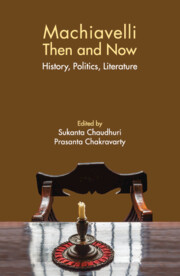7 - ‘To Give Reputation to One’: Machiavelli the Populist and Other Variations on II Principe, Chapter 9
Published online by Cambridge University Press: 21 January 2022
Summary
One of the main problems of modern Machiavelli criticism is what might be summarized in the polarity ‘philosopher versus politician’—that is, the distinction between a ‘theorizing’ Machiavelli, political scientist and political philosopher, and a ‘practical’ Machiavelli, little interested in doctrine, attached only to the events of his time—moreover, a Florentine Machiavelli, addressing a span of concerns from the municipal to the national. The opposition widens when interwoven with discrepant assessments of Machiavelli's culture and of the reading that feeds his knowledge. For some, that knowledge is largely second-hand and ‘municipal’ in character, while for others it is comparable to that of a true humanist scholar.
I think it is possible to obviate this debate. The opposed factors are both legitimate, and complementary. It is no doubt necessary to recover practical intentions and immediate contexts; but this can also shed light on wider issues, such as—to anticipate the critical point I will address in this chapter—the Medicean (or Soderinian) interpretation of the civil principality (‘principato civile’), in relation to the theoretical need for autonomy, security, and ‘statehood’ characterizing Machiavelli's entire treatise.
To succumb entirely to the imperatives of the contingent can result in a reductionism that leaves unexplained the ideal and doctrinal influence that Machiavelli has exercised for five centuries. It restricts the range of Machiavelli's thought to the politics of the present, whether Machiavelli's present or our own. The inadequacy of this view mirrors that of its opposite: an aseptic theory that makes Machiavellism a universal vade mecum, extending even to its naïve but sinister use by the American neocon right. The risk of such spectacular reductionism should not be underestimated.
It is true that Machiavelli's complexity cannot be altered to fit a theory, or a presumed ‘coherence’ to be defended at all costs. We cannot reconcile the countless, and sometimes contradictory, theoretical points of the treatise into a cohesive philosophical system, ignoring moments of genuine aporia. But we cannot glibly admit such aporia, or even simple contradictions, as an excuse for our own interpretative limitations. We must first make every effort to grapple with the text and its contexts.
In short, between the high-flying theorist of ‘scientific’ method and the strategist of local operations, perhaps there is a space where we can place an analyst Machiavelli. The analyst speaks for the immediate, but in general terms.
- Type
- Chapter
- Information
- Machiavelli Then and NowHistory, Politics, Literature, pp. 121 - 142Publisher: Cambridge University PressPrint publication year: 2022



